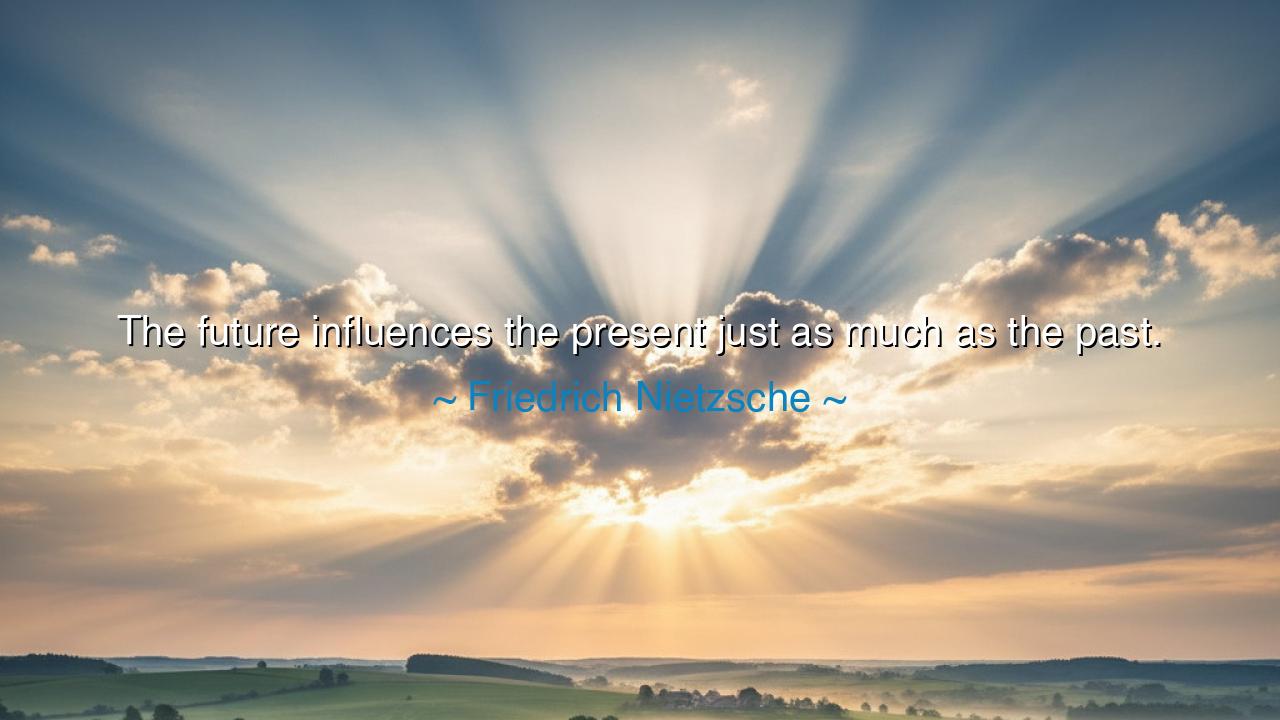
The future influences the present just as much as the past.






"The future influences the present just as much as the past." These words, spoken by Friedrich Nietzsche, speak to the profound interplay between time, choices, and destiny. In this thought-provoking statement, Nietzsche reminds us that while we often think of the past as shaping who we are today, the future, too, exerts its own influence. Our decisions today are not just guided by the weight of history, but are also influenced by the vision and dreams of what we hope to achieve in the days to come. The future is not a distant, unknown force, but a living, breathing presence that shapes our every action, thought, and intention.
In ancient wisdom, there was often a recognition that time was not linear, but cyclical, and that the past and future were inextricably intertwined. The Greeks believed in the concept of eternal recurrence, where the events of the past would return in the future, shaping each new iteration of life. The great philosopher Heraclitus also spoke of the unity of opposites, where change and permanence exist side by side. For Heraclitus, everything is in a constant state of flux, and the future is merely another chapter in the eternal cycle, influencing and being influenced by the past. In this context, Nietzsche’s words resonate deeply with the ancient understanding that time is not simply something that happens to us—it is something we shape and are shaped by.
Consider the life of Julius Caesar, whose legacy was both the result of past decisions and a vision of the future. Caesar rose to power in Rome through a combination of military genius, political acumen, and his ability to anticipate the future. He understood that the actions he took—whether in the Senate or on the battlefield—were not just reactions to the past but were decisions that would shape the future of Rome. He was keenly aware that his ambitions would leave a mark on the future, influencing both the Roman Republic and its inevitable transformation into the Roman Empire. Caesar’s vision of the future was a driving force behind his decisions, showing that our future goals can and will shape the actions we take in the present.
Mahatma Gandhi, too, understood that the future is not a distant abstraction but a powerful influence on the present. His vision of an independent India was not simply a response to the colonial past, but a bold declaration of what was to come. Gandhi’s decision to engage in nonviolent resistance was shaped by his deep belief that the future of India would be built on the principles of truth and nonviolence. The way he conducted his life, with an unwavering commitment to this vision, influenced the actions of millions and set the stage for the independence of India. Gandhi's life was a testament to Nietzsche’s insight: the future, as a vision and influence, shapes us even as we shape it.
Nietzsche’s words also speak to the power of intention and the creative force of the mind. When we think of the future, we are often filled with a sense of possibility, of dreams not yet realized. But these dreams, as Nietzsche suggests, do not simply sit on the horizon awaiting our arrival; they shape our present decisions. The actions we take today, from the small choices in our daily routines to the larger commitments we make, are often fueled by a vision of who we wish to become or what we wish to create. Just as a builder is guided by a blueprint of the future, we, too, are guided by the dreams and aspirations we carry within us.
The future is not something that waits passively for us to arrive; it is actively engaged in the present, nudging us forward, shaping our every choice. This is not to say that the past is not important, for our history shapes us, our values, and our experiences. But just as the present reflects the past, it is equally a canvas upon which the future is painted. Our dreams, our vision, and our goals for tomorrow push us toward action today. In fact, often it is in anticipating the future that we find the strength to act boldly, to break free from the inertia of the present and to take the risks necessary to build the life and world we desire.
In your own life, let this truth guide you. Do not be paralyzed by the past, nor do you need to be driven solely by the fears or expectations of what might happen in the future. Create a vision for yourself, a vision that not only acknowledges the lessons of the past but also projects forward into the possibilities of tomorrow. Know that the choices you make today will not just reflect who you have been, but will build who you will become. The future is not something to fear, but something to embrace, for it is a living force that helps shape who you are in the present. Let this vision drive your actions and decisions, knowing that the future is shaping you as much as you are shaping it.






AAdministratorAdministrator
Welcome, honored guests. Please leave a comment, we will respond soon